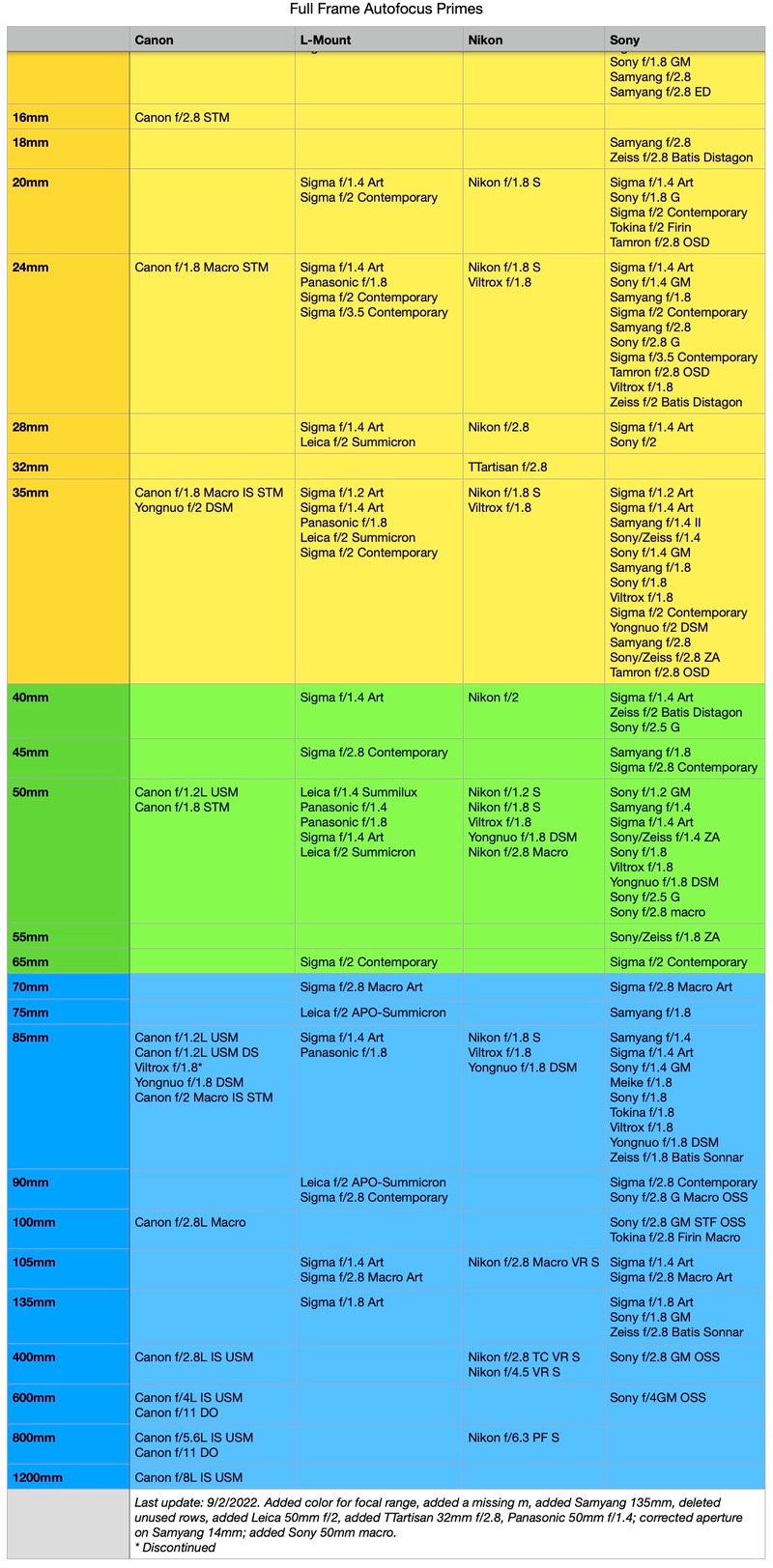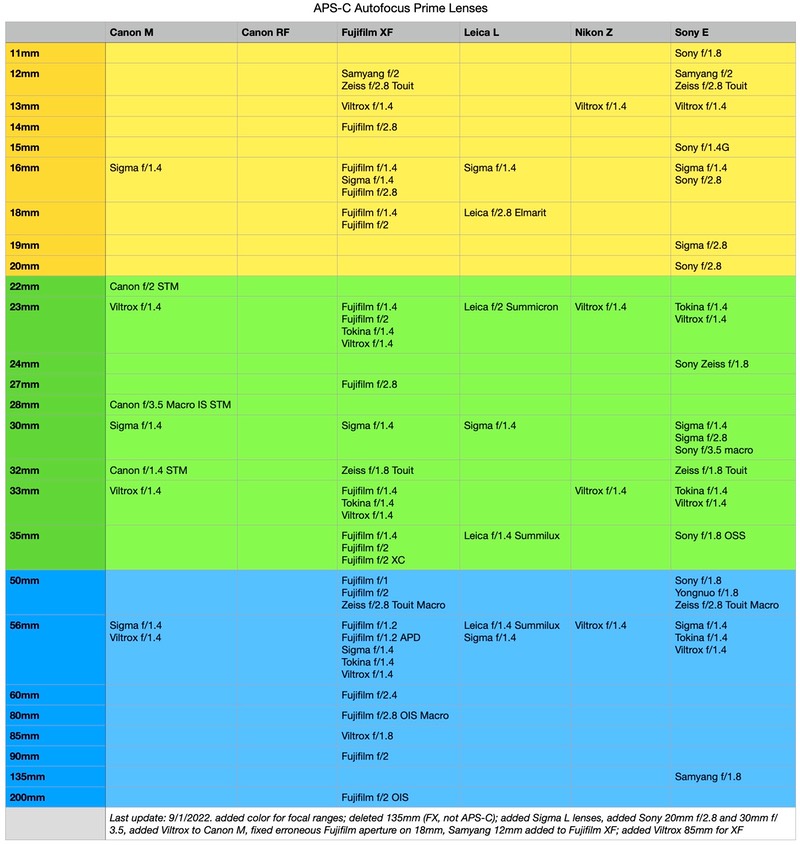Updated: 9/2/22
After coming down hard on dpreview's attempt to show what's available in terms of autofocus lenses for the full frame mirrorless camera mounts last week, I decided I needed to put my keyboard where my mouth is and attempt to do the topic better justice. Today, I'll start with prime lenses (zooms are a little more difficult to categorize due to their variations). I'll also cover APS-C mirrorless mounts, which dpreview didn't tackle.
If you need to understand how the focal lengths differ, see Lens Angle of View.
Here's the full list of what I came up with for full frame prime lenses that are currently available (organized by mount, in declining aperture order, alphabetically). I've used color to distinguish wide angle (yellow), mid-range (green), and telephoto (blue) lenses. I know that my definitions are a little arbitrary, but doing this gives you a quick way of sussing what a mounts strengths and weaknesses are.

As far as full frame primes are concerned, it should be clear that Sony's FE mount has the widest choice currently available, though that tends to logjam between 24 and 85mm, and is clearly due to better third-party support.
However, it's easy enough to see some clear patterns within the four mounts:
- Canon RF — Canon's mostly going it on their own at the moment, with only two third-party primes from Yongnuo giving any supplement (and that's not fully a given due to Canon's attempts to shut down third party choices). Significant lenses are missing: 20mm, 28mm, and 135mm, for instance. If there's a strength in Canon's early RF prime lineup, it comes in the long telephoto choice. Indeed, it's the widest range of options for the four mirrorless mounts at the moment, though Nikon is about to whittle that advantage down some more.
- L-mount (Panasonic) — A surprising number of choices. More choices than Canon or Nikon, but this is mostly due to the fact this is a mount alliance with three primary suppliers (Leica, Panasonic, and Sigma). Panasonic's offerings are mild: four primes. It's mostly Sigma that's filling in the gaps, though Leica also fills in three of the focal lengths. While Panasonic is currently only providing 24mm to 85mm, the Leica/Sigma connection extends that to 14mm at the wide end and 135mm at the telephoto end. Significantly missing from the L-mount are lenses that would appeal to sports and wildlife photography (e.g. >200mm prime).
- Nikon Z — Gets some help from TTArtisans, Viltrox, and Yongnuo, though those really only provide additional choices where Nikon already has a lens. Nikon has nothing below 20mm, and Nikon's 86-399mm range has only a lonely macro lens at present. As with Canon, one of Nikon's stronger showings is in long telephoto, particularly with the 600mm f/4 about to hit coupled, with the built-in teleconverter of the 400mm f/2.8 already also covering the 500mm f/4 length.
- Sony FE — With all that third-party support filling in the wide to modest telephoto range, it's really only the long telephoto range where Sony needs more choice. I would argue that telephoto primes are still Sony's weak point, and getting more so each day as Canon and Nikon announce new lenses.
Were Samyang or Sigma to start making Canon RF and Nikon Z lenses, the prime landscape—other than the long telephoto options—would level out very, very quickly. Of course, Canon is threatening legal action against third party lens makers, so that's not going to happen in the RF mount (and note how that also impacts RF-S, below). Nikon, on the other hand, seems to be playing a quiet game with third party lens makers, allowing them but not promoting them. Nikon's closest third-party supplier would be Tamron, which has only three prime lenses in their current lineup that might come aboard eventually (20mm, 24mm, 35mm, all f/2.8).
I'd guess that the current situation in primes for full frame is going to continue much as it is now: Canon and Nikon will be mostly going it alone, Sigma will continue to be the primary supplier in the L-mount, and Sony will be well supported up through 135mm, but starting to fall behind above that focal length.
Okay, let's try APS-C. How is the autofocus prime lens lineup shaping up for crop sensor mirrorless users?

Very different! Sony users should be having a bit of concern, even with the recent wide angle options that have appeared. It's the third party support that's bolstering Sony APS-C, not Sony. Meanwhile, Fujifilm has stormed to the lead.
Once again we see some clear patterns:
- Canon M — A scattering of support, both from Canon, Sigma, and Viltrox. But that only provides options from 24-85mm equivalent. Unfortunately, the M-mount cameras seem to be at a dead end, and we've seen no new Canon M-mount lenses for four years. I don't see the M-mount situation getting better in the future.
- Canon RF-S — Crickets. Buzz buzz*. Nada. I suspect we'll see the transfer of a few M lenses to RF designs, since that should be easy enough for Canon to do. But that's just three primes. The prohibition on third-party lenses in the RF mount that Canon is trying to enforce isn't going to help them. Basically, you're going to be buying M-mount conversions from Canon, and RF full frame primes to fill in for RF-S, is my guess.
- Fujifilm XF — The mount with the mostest. I'd characterize the XF options as both broad and deep, as you have the largest range of choices in focal length, and with multiple brands at several key focal lengths. Both Fujifilm and third parties have really filled out the options in the XF mount, giving you 16-300mm equivalent choices. Nikon executives have only to look at this column in my table to understand how they ceded away all those DSLR DX users to Fujifilm mirrorless cameras over the years. Even in the now end-of-life DSLR DX line, the available choices would look far slimmer, and that was after 20 years of building them. Now you know why I was writing buzz, buzz, all those years. I saw it. Fujifilm saw it. Nikon? See what?
- Leica L — The TL cameras now seem to be on closeout—they're the cheapest way to buy a new Leica at the moment—and partner Panasonic isn't interested in APS-C, so L-mount APS-C options modest. Sigma added their trio, which helps and makes that column stand out even more from Canon and Nikon ;~). Still, L for APS-C seems to be done. The list you see here is probably the final list.
- Nikon Z DX — Fortunately Nikon hasn't tried to shut Viltrox down as Canon has, otherwise it would be crickets in the Nikon DX column, too. Nikon has announced a 24mm DX prime is coming, but when it will appear is impossible to say. The only good news is that a few recent FX primes also provide some options DX users will like, most notably at 28mm f/2.8, 40mm f/2, and 50mm f/2.8 macro. I'd guess that Nikon saw those lenses as targeting both Z5 (FX) and Z50 (DX) customers. Still, Nikon currently has infinity more cameras than lenses in APS-C (DX in Nikon-speak). Oh wait, you can't divide by zero, can you? (buzz, buzz).
- Sony E — Of these mounts, E is the one with the longest history, but curiously, not with the most options. Sony appears to be taking competitive advice from Nikon DSLR DX, and starving their APS-C line while emphasizing full frame cameras and lenses. Sony also took a long rest in APS-C lenses after Samsung decided to stop competing with them head to head. Apparently the Sony executives went sleeping at that point, as the Fujifilm bullet train passed them on the tracks and disappeared into the distance. Recently, we've seen some renewed interest in delivering APS-C lenses from Sony, but mostly in the wide angle end to help support their vlogging camera. That said, from 16-85mm equivalent you have a decent range of choice in the NEX, uh, E mount.
For those contemplating APS-C cameras and primes, let me say this: the Sigma, Viltrox, and Zeiss options are all quite good, and shouldn't be ignored. I'll eventually finish my full set of Viltrox reviews over at zsystemuser.com. At one point I had reviews of all of the Sigma lenses on this site, too, but I've removed them as they're now out of date to the cameras you'd be using them on. I reviewed them on 12mp to early 24mp cameras, and we're now in a much better 24-33mp world, so I need to redo those reviews to be current.
While I've tried to be complete, up-to-date, and accurate in this article and charts, please inform me of any errors you might find so I can correct them, as necessary. This is a big task, and the sands shift on an almost daily basis. Permanent link to this article is in lens section.
*Buzz, buzz is my shorthand for acting like a fly in management's face while they're just sitting on their butts doing nothing. Yes, I'm trying to annoy them. Maybe they'll get up and go to the R&D lab and ask for some lenses to act as fly repellant.